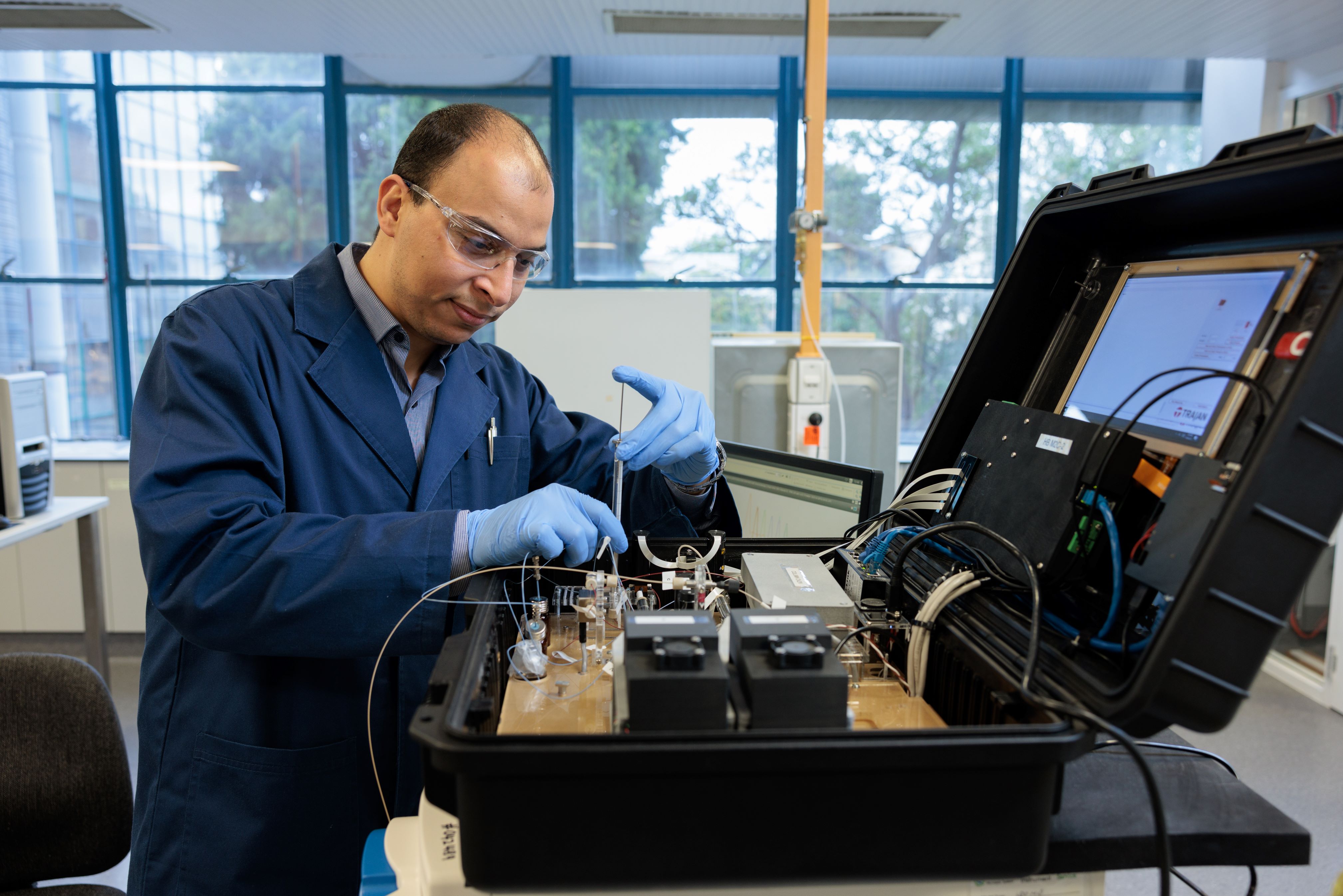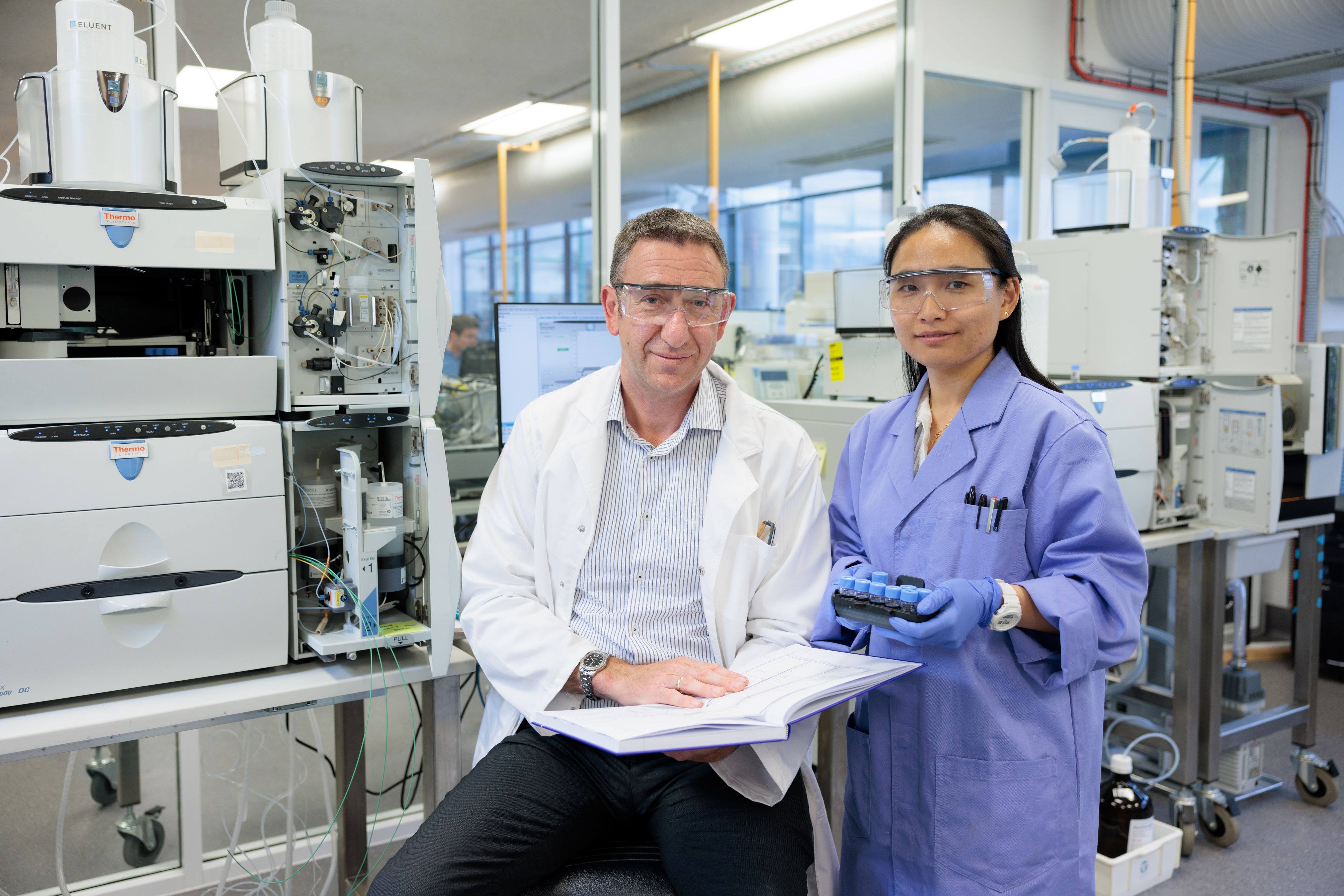A new centre for cutting-edge research and post-graduate training in the field of separation science has launched in Hobart, in a move that connects the University of Tasmania’s world-leading analytical chemistry research group with renowned academic and industrial leaders in the field around the country.
The Australian Research Council (ARC) Training Centre for Hyphenated Analytical Separation Techniques, known as HyTECH, will continue a long tradition in Tasmania of the development of new and advanced analytical chemistry technologies capable of isolating specific target molecules from within complex mixtures to accurately measure them.
HyTECH researchers and PhD students from across three partner institutions, which also include Deakin University in Victoria and The University of Queensland (UQ), will investigate the application of separation science to areas like food quality control, water and environmental monitoring, and fine chemical manufacturing processes.
HyTECH Director Professor Brett Paull said working with local and national organisations, such as the Australian Antarctic Division, Department of Defence, or Derwent Estuary Program alongside multinational instrument manufacturers like Thermo Fisher Scientific and Trajan Scientific and Medical, ensured the practical requirements of technology end-users were always front of mind.
“A focus for the team will be to ensure that we continue to develop science and technology in areas that are applicable to real-world situations, and that can help real people and the communities they serve to solve the challenges they face,” Professor Paull said.
“Whether it’s spotting fake foods, investigating Antarctic ice cores for markers of climate change, or tracking harmful contaminants in the environment, this work can make an enormous difference in a huge range of areas, so we’re excited to continue our journey.”
HyTECH has a mission to train the next generation of PhD students in the development and application of this advanced technology and provide the next generation of experts to industry.
Deputy Vice-Chancellor (Research) at The University of Tasmania Professor Anthony Koutoulis said the $6.9 million investment by the ARC and Centre partners in HyTECH over the next five years was a privilege for the three universities.
“We are extremely proud to be contributing to the training of a research workforce with cutting edge expertise that drive the innovative solutions needed to meet current and future challenges in industry and the environment,” Professor Koutoulis said.
“Each of the partners also brings distinct expertise to the ARC Training Centre, enabling the HyTECH team, through close collaboration with industry, to deliver immense impact to businesses and communities in Tasmania, Australia and beyond.”

Scientists investigate health threats in the environment
The UQ team, led by Professor Kevin Thomas, Director of UQ’s Queensland Alliance for Environmental Health Sciences (QAEHS), will focus on HyTECH research platform ‘Environmental science and monitoring’, which aims to improve human health outcomes through environmental health science.
QAEHS is a leading centre in the field of trace chemical and particulate pollutant monitoring, with state-of-the-art analytical facilities, including numerous hyphenated mass spectrometry techniques, a unique contaminant-controlled clean lab and a world-class archiving facility.
Nano-sized plastic particles are a ubiquitous environmental contaminant, and the Brisbane-based team will work to determine the presence and volume of these in water and urban air settings.
They will also investigate the use of high-resolution mass spectrometry to identify chemical hazards that are historic, new or emerging. This will help environmental regulation agencies globally to understand the risks and impacts of environmental hazards more effectively.
Dissecting the chemistry of flavour
Professor Russell Keast and his team at Deakin University’s Consumer Analytical Safety Sensory (CASS) Food Research Centre use their expertise in gas chromatography, mass spectrometry and olfactometry detection to dissect flavour from complex food samples.
"Instrumental analysis of compounds in food and beverages is important to identify chemical components of flavour,” Professor Keast said.
“But it is when we combine the instrumental analysis of compounds with taste and smell perception that we give meaning to the data, so this is a strength that CASS brings to HyTECH’s research platform ‘Food systems and natural products‘."
The projects that the Deakin HyTECH team will work on include helping consumers trust the provenance and authenticity of their foods, by addressing several significant knowledge gaps in authenticity determination, which includes introducing several novel technological advances including simplified hardware and new data interpretation strategies.
The team will also work on optimising the flavour of ultra-heat-treated (UHT) flavoured milks which can live on the shelf for more than six months, but with flavour deterioration after one month; and helping speed up the processes for detection of bacteria in food time to near-real time.

Portable technology offers real-time information
The team at the University of Tasmania will work on the HyTECH research platform ‘Applied materials and portable hyphenated technologies’, solving fundamental and technical challenges in analytical science, led by Professor Paull.
In partnership with major industry partners, the team will continue to advance portable and modular sampling, sample handling, and liquid chromatography-based technologies that can simplify in-situ analysis across multiple sectors.
Many challenges in personalised healthcare, bioanalytical science and environmental science can be addressed or improved using the new novel analytical technologies and techniques developed by this team.
Professor Paull said the HyTECH research team was dedicated to a deeply collaborative approach to advancing separation science in Australia.
“While we each bring our specialty expertise to the Training Centre, we want to provide the best possible learning experiences for our upcoming experts: this will involve opportunities for PhD candidates and early career researchers to experience the facilities and infrastructure in all three locations,” he said.
“Our projects are also all cross-institutional, with academic investigators spread across all three nodes – this means we gain the greatest diversity of thought, skills and experience as we solve each challenge.
“We believe we are stronger when we work together, so that’s what we’ll be doing.”
Find out more about HyTECH or learn about our PhD opportunities by visiting: hytech.au/opportunities


